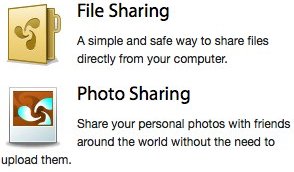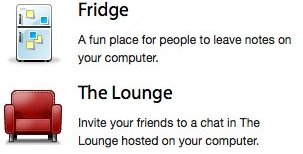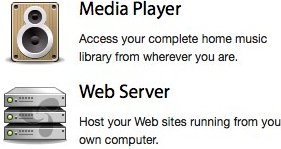 Opera, the Norwegian browser with little under 1% market share of the English market, has made an interesting announcement. Following a much hyped mystery campaign, “Opera Unite” has been announced as a new way to interact with the browser. It transforms the browser into a server – so that your local computer can interact across the Internet in a peer-to-peer fashion. Or in simpler words, you can plug your photos, music and post-it notes into your Opera Unite installation – and be able to access that media anywhere on the Internet, be it another computer or your mobile phone. I view this as conceptually as an important landmark in data portability. The competing browser company Mozilla may lay claim to developing ubiquity, but Opera’s announcement is a big step to ubiquity the concept.
Opera, the Norwegian browser with little under 1% market share of the English market, has made an interesting announcement. Following a much hyped mystery campaign, “Opera Unite” has been announced as a new way to interact with the browser. It transforms the browser into a server – so that your local computer can interact across the Internet in a peer-to-peer fashion. Or in simpler words, you can plug your photos, music and post-it notes into your Opera Unite installation – and be able to access that media anywhere on the Internet, be it another computer or your mobile phone. I view this as conceptually as an important landmark in data portability. The competing browser company Mozilla may lay claim to developing ubiquity, but Opera’s announcement is a big step to ubiquity the concept.
Implications: evolving the cloud to be more democratic
 I’ve had a test drive, but I’m not going to rehash the functionality here – there is plenty of commentary going on now. (Or better yet, simply check this video.) I don’t think it’s fair to criticise it, as it’s still an early development effort – for example, although I could access my photos on my mobile phone (that were stored on my Mac), I could not stream my music (which would be amazing once they can pull that off). But it’s an interesting idea being pushed by Opera, and it’s worth considering it from the bigger picture.
I’ve had a test drive, but I’m not going to rehash the functionality here – there is plenty of commentary going on now. (Or better yet, simply check this video.) I don’t think it’s fair to criticise it, as it’s still an early development effort – for example, although I could access my photos on my mobile phone (that were stored on my Mac), I could not stream my music (which would be amazing once they can pull that off). But it’s an interesting idea being pushed by Opera, and it’s worth considering it from the bigger picture.
 There is a clear trend to cloud computing in the world – one where all you need is a browser and theoretically you can access anything you need for a computer (as your data, applications and processing power are done remotely). What Opera Unite does, is create a cloud that can be controlled by individuals. It’s embracing the sophistication home users have developed into now that they have multiple computers and devices, connected in the one household over a home wireless network. Different individual computers can act as repositories for a variety of data, and its accessibility can be fully controlled by the individuals.
There is a clear trend to cloud computing in the world – one where all you need is a browser and theoretically you can access anything you need for a computer (as your data, applications and processing power are done remotely). What Opera Unite does, is create a cloud that can be controlled by individuals. It’s embracing the sophistication home users have developed into now that they have multiple computers and devices, connected in the one household over a home wireless network. Different individual computers can act as repositories for a variety of data, and its accessibility can be fully controlled by the individuals.
 I think that concept is a brilliant one that brings it to the mass market (and something geeks won’t appreciate as they can already do this). It’s allowing consumers an alternative to storing their data, but still have it accessible “via the cloud”. As the information value chain goes, people can now store their data wherever they wish (like their own households) and then plug those home computers into the cloud to get the desired functionality they desire. So for example, you can store all your precious children pictures and your private health information on your home computer as you’ve chosen that to be your storage facility – but be able to get access to a suite of online functionality that exists in the cloud.
I think that concept is a brilliant one that brings it to the mass market (and something geeks won’t appreciate as they can already do this). It’s allowing consumers an alternative to storing their data, but still have it accessible “via the cloud”. As the information value chain goes, people can now store their data wherever they wish (like their own households) and then plug those home computers into the cloud to get the desired functionality they desire. So for example, you can store all your precious children pictures and your private health information on your home computer as you’ve chosen that to be your storage facility – but be able to get access to a suite of online functionality that exists in the cloud.
As Chris Messina notes, there is still an opera proxy service – meaning all your data connecting your home computer to your phone and other computers – still go through an Opera central server. But that doesn’t matter, because it’s the concept of local storage via the browser that this embodies. There is the potential for competing, open source attempts in creating a more evenly distributed peer-to-peer model. Opera Unite matters, because it’s implemented a concept people have long talked about – packaged in a dead easy way to use.
Implications: Opera the company

For poor little Opera, this finally gives it a focus to innovate. Its been squashed out of the web browser market, and its had limited success on the mobile phone (its main niche opportunity – although with the iPhone now facing a big threat). Google’s chrome is fast developing into the standard for running SaaS applications over the web. But Opera’s decision to pursue this project is innovating in a new area, and more inline with what was first described as the data portability file system and the DiSo dashboard.
Like all great ideas, I look forward to Unite being copied, refined, and evolve into something great for the broader world.








